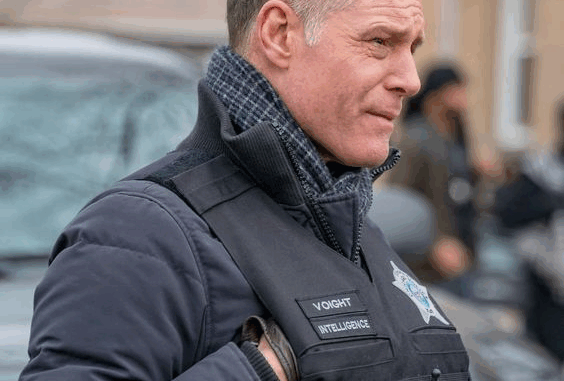The End Of An Era: Jason Beghe’s Heartbreaking Interview Reveals The Secret Battle Behind The Badge, Sparking Fears This Is His Final Goodbye To Chicago P.D.

Jason Beghe has always been the embodiment of resilience — a man whose gravelly voice, steely stare, and unflinching energy brought Sergeant Hank Voight to life on Chicago P.D. for over a decade. Yet behind that hardened exterior, the actor himself is facing a far quieter and more personal fight. In recent interviews and candid off-screen moments, Beghe has opened up about the toll that age and old injuries have taken on his body, revealing a reality that contrasts sharply with the fearless lawman millions see every week. For years, his voice has been his signature — rough, husky, unmistakably his. But few know that it’s also the result of a near-fatal car accident that left him with severe injuries, including broken bones and damaged vocal cords. That raspy tone isn’t just an artistic choice; it’s a scar. Beghe survived that crash against all odds, but he’s admitted the recovery left him permanently changed. Now, as he enters his mid-sixties, those changes are becoming harder to hide.
On set, Beghe has been seen moving a little slower, his expressions sometimes tighter with effort. There are moments when his body language hints at discomfort — a subtle limp, a visible tremor, a tired breath caught mid-sentence. Fans have noticed, and speculation has followed, but what Beghe himself has confirmed is simple: time leaves its mark. He’s spoken openly about feeling the effects of aging, about how performing action-heavy scenes is no longer as effortless as it once was. Still, what sets him apart is his refusal to frame it as defeat. He talks instead about adaptation, discipline, and gratitude — about learning to work
with his limitations rather than against them.
Beghe has always been known for intensity. When he speaks, it’s not with polished charm but raw honesty. That honesty now extends to how he describes his changing body. “You reach a point,” he’s hinted, “where you realize you’re not invincible. But maybe that’s what makes you real.” Those words ring especially true in the world of
Chicago P.D., where his character has evolved from a violent antihero to a deeply reflective, world-weary leader. The parallels between man and role are impossible to ignore. As Beghe himself grows older, Voight seems to grow older with him — slower, more contemplative, carrying not only emotional burdens but the physical signs of a long fight.
Colleagues have described him as fiercely dedicated, often pushing through exhaustion to deliver the kind of authenticity that has defined his career. Crew members talk about his determination — the way he insists on doing his own intense scenes, his commitment to staying present even on grueling days. But behind that determination lies a private struggle. Beghe has hinted that the years of physical strain, combined with lingering pain from his past injuries, sometimes make long shoots punishing. The combination of chronic discomfort and the psychological weight of constant performance has forced him to find new rhythms, to pace himself differently. It’s not about ego anymore; it’s about endurance.
His raspy voice, which once felt like an aesthetic trademark, has at times become a challenge. Long takes, shouting scenes, emotional confrontations — all of them can strain what’s already fragile. Yet rather than fight against that fragility, Beghe has made it part of his art. The cracks in his voice have become symbols of truth, the imperfections that make his performances more human. There’s an authenticity now that no amount of youth or vitality could replace. When Voight speaks, the voice isn’t just acting — it’s memory, history, pain. It’s a reminder that strength can coexist with weariness.
Some fans have worried that Beghe’s visible tremors or slower movements could point to something more serious, but the actor has clarified that they stem from lingering neurological effects of his old accident, not from a new diagnosis. That distinction matters to him — not because he fears aging, but because he refuses to be defined by illness. His outlook remains pragmatic: he accepts the price of what he’s survived. “You get knocked down, you heal, and you move on,” he’s said. “But sometimes healing doesn’t mean going back to who you were. It means learning to live with what’s changed.” Those words have become his quiet mantra, reflected both in his performance and in how he carries himself when the cameras stop rolling.
Off set, Beghe’s lifestyle has reportedly become simpler. He’s traded intensity for intention — prioritizing recovery, meditation, and quiet time with friends and family. He’s described finding peace in stillness, a marked contrast from the chaos his character embodies. For a man who once described his own life as “a series of collisions,” this new rhythm feels like a reconciliation — a way of honoring both survival and surrender. It’s a rare perspective in an industry that often worships eternal youth and hides vulnerability behind retouched images. Beghe doesn’t hide. His wrinkles, his scars, his voice — they all tell the story of someone who has lived, fallen, broken, and rebuilt.
The challenge of continuing Chicago P.D. while managing those realities is something he faces head-on. The show’s long hours and emotionally charged storylines demand consistency, yet Beghe has managed to sustain a performance that remains raw and riveting. If anything, the weight of experience has deepened his portrayal. There’s a kind of exhaustion in his eyes now — not just character fatigue, but human fatigue — and that makes his work all the more powerful. Audiences aren’t just watching a cop fighting crime; they’re watching a man fighting time.
Hollywood is filled with actors who mask the effects of age with denial or surgery, but Jason Beghe’s appeal lies in his refusal to pretend. His aging isn’t hidden; it’s woven into his art. Every tremor, every slow breath, every gravelly line feels like a testament to survival. That honesty gives his performance a gravity that few younger actors could achieve. In many ways, his body has become his greatest storytelling tool — imperfect but truthful, worn yet unbreakable.
As he continues to navigate his career, there’s a sense that Beghe is preparing for a gradual shift — perhaps fewer action scenes, perhaps more emotional depth, perhaps even a behind-the-camera role. But whether he chooses to stay in front of the lens or step back, his legacy is already secured. He’s the rare kind of actor who turns personal struggle into narrative strength. His pain isn’t hidden; it’s translated into art. And that’s why audiences still connect with him — because he doesn’t just play a man who’s been through hell; he
is one.
In an industry obsessed with perfection, Jason Beghe’s imperfections are his rebellion. He’s living proof that resilience isn’t about staying untouched by time, but about showing up again and again despite it. His body may carry reminders of every fight he’s survived, but his spirit still burns with the same quiet ferocity that made him a star. Behind the badge, behind the camera, behind the gravel and grit, there’s a man who refuses to stop — even when it hurts. And maybe that’s the most heroic thing about him
DWTS to bring in big changes next season including all-new ‘modern’ fan voting process

DANCING With the Stars plans on bringing some big shakeups to the ballroom next season – including a change that will give the show a more ‘modern’ spin, The U.S. Sun can exclusively reveal.
The big shift comes off of season 34’s historic year, which included a record-high number of over 50 million fans voting from home.


With the increase in voting, which was up 11% from the previous week, ABC executives have been weighing the options of how they can lean even more into the process.
Currently, the main way to vote for DWTS contestants and the pros is by texting the celebrity’s name to the code 21523.
However, production is looking into how they can implement more modern technology, such as social media, into the process.
“While this season has seen an increase in ratings and votes, execs are looking into how they can modernize their voting process.
READ MORE ON DWTS
“As of right now, they do it old school with texting a number to vote for a celeb.
“The execs have been adamant about integrating things like social media into the voting process, specifically TikTok.
“It hasn’t been ironed out yet, but they’re trying to make voting more accessible and want it to reach a wider audience for season 35,” the source claimed.
In addition to texting, viewers can also go to dwtsvote.abc.com; however, the majority of the votes still come from texting.
Currently, voting is limited to 10 votes per person and per method of voting.
Voting is also only allowed during the window the show airs live on the East Coast and varies by time zone, which is regularly encouraged by show hosts Julianne Hough and Alfonso Ribeiro.
While voting has always been done primarily by text messaging, the time window is a more recent change to the show.
In 2019, DWTS implemented the current protocol of voting only being allowed during the live East Coast feed – meaning those in other time zones wouldn’t get to vote when their show aired.
DWTS judge Carrie Ann Inaba slammed by two furious pros for ‘unfair’ critiques after fans call for her to be fired
While the move was labeled as “unfair” by many, the show has continued with the method.
BALLROOM BUST?
The current season of DWTS has been a huge success for ABC and Disney – but it has not been met without its fair share of drama.
Throughout the season, the judging panel has been called out by both the pros and by viewers at home for low scores and harsh comments towards select contestants.
Fans have also accused judges Carrie Ann Inaba, Bruno Tonioli, and Derek Hough of “overscoring” their “favorite” contestants, including The Secret Lives of Mormon Wives, Whitney Leavitt.
Things have apparently gotten to the point where members of the show felt the need to confront production over the direction it’s heading.
“There are a handful of pros, both some who are still on the show and some who have already been eliminated, who are fed up with how they are being treated.
“Some feel the judges have been harsher than they needed to be to them, which not only impacts scores, but it also impacts how the at-home viewers see the season.
“It impacts who they vote for and who they want to watch week by week.
“Other pros like Alan and Pasha feel extra protective of their partners and feel the judges have been too harsh on them.
“Multiple pros have stepped up to meet with production over the judges’ bias and are demanding some kind of change and more fairness moving forward.
“What that change looks like is still to be determined, but they at least got the conversation rolling,” a source claimed.
Dancing With the Stars season 34 airs on Tuesdays at 8pm EST on ABC and is available to stream the following day on Disney+ and Hulu.







